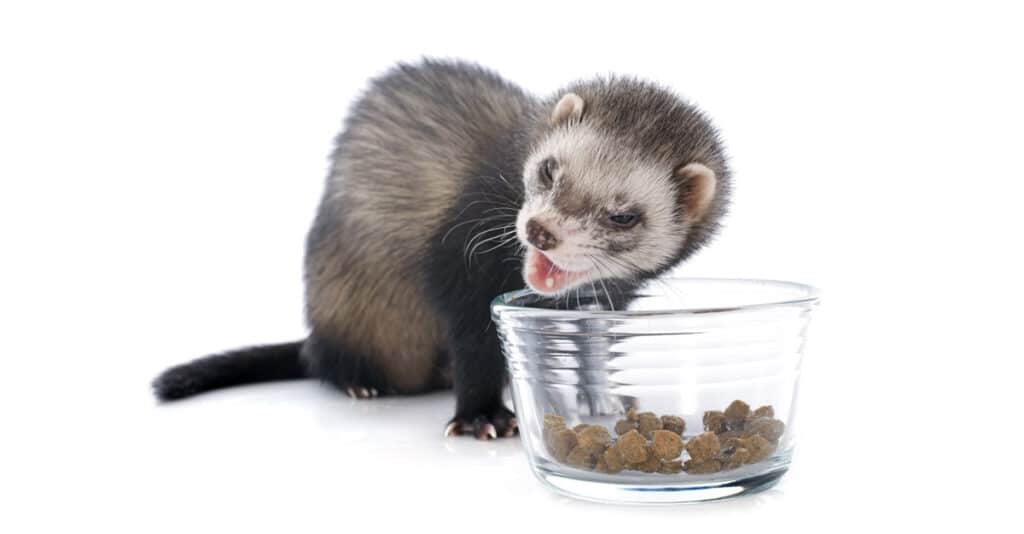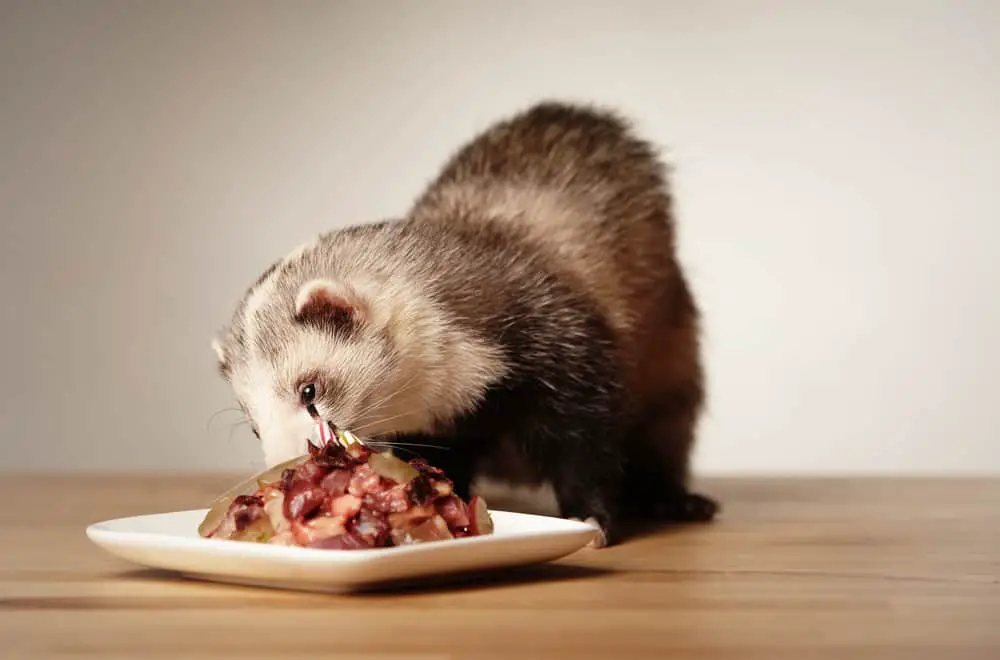Introduction
What Is The Best Ferret Food: Ferrets, those playful and inquisitive small mammals, make for delightful companions for many pet owners. However, ensuring their health and happiness requires careful consideration, particularly when it comes to their dietary needs. Choosing the best ferret food is a crucial aspect of responsible ferrets aggressive ownership, as it directly impacts their overall well-being, longevity, and vitality. In this exploration, we will delve into the world of ferret nutrition, examining the key factors that determine the best ferret food options available in the market. Whether you are a seasoned ferret enthusiast or a novice owner, understanding the nuances of ferret dietary requirements is essential for providing your furry friend with a life of optimum health and vitality.
So, join us as we unravel the secrets to selecting the best food for your ferret’s nutritional needs and uncover the ingredients that promote their well-rounded development and happiness. When it comes to ferret nutrition, there are numerous factors to consider, from the specific dietary needs of these carnivorous creatures to the various options available in the market. Ferrets require a diet rich in animal-based protein and fat, as their bodies are designed to metabolize these nutrients efficiently. The best ferret food should mimic their natural diet, which consists mainly of small prey animals like rodents and birds.
In recent years, there has been a growing awareness of the importance of proper nutrition for ferrets, leading to a wider range of commercial ferret foods available. However, with so many choices, it can be challenging for ferret owners to determine which food is truly the best for their pets. In this exploration, we will dive deep into the world of ferret food, discussing the nutritional requirements of ferrets, the pros and cons of different types of ferret diets (kibble, wet food, and raw diets), and how to evaluate the quality of commercial ferret foods. We’ll also consider special dietary considerations for ferrets with specific health issues and explore homemade and balanced diet options for those who prefer a more hands-on approach to their pet’s nutrition.

What food can I give my ferret as a treat?
It’s better to feed your ferret some lean, cooked piece of meat, like a piece of turkey or chicken or a small piece of cooked egg. Those are all appropriate and contain high protein for your ferret. You can even give your ferret a slice of deli meat as a treat.
Commercial Ferret Treats: Many pet stores offer specialized ferret treats that are formulated to meet their nutritional requirements. Look for treats made from high-quality ingredients with real meat as the primary ingredient. These treats are often designed to promote dental health and can be a convenient option.
Freeze-Dried Meat Treats: Freeze-dried meat treats, such as freeze-dried chicken or turkey, are excellent choices for ferret treats. They provide a concentrated source of protein without added fillers or preservatives. Break these treats into small pieces for portion control.
Ferret-Specific Snacks: Some brands offer ferret-specific snacks designed to cater to their dietary needs. These may include meat-based morsels or soft chews. Be sure to read the ingredient list and choose options with minimal additives.
Cooked Egg: Ferrets can enjoy small amounts of cooked egg as a treat. Scrambled or hard-boiled eggs without any seasoning are safe and provide a protein boost. Limit egg treats to a small portion due to their high-fat content.
What is a ferrets favorite meat?
Ferrets love both cooked and raw meat, in particular rabbit, poultry and mice. Raw meat should be given fresh and don’t worry about the bones, ferrets can eat bones and they are a great source of calcium, marrowbone and minerals.
Chicken: Fresh and boneless chicken meat is often a top choice for ferrets. It’s a lean source of protein and easy to prepare. Many ferrets enjoy the texture and taste of chicken.
Turkey: Like chicken, turkey is another poultry option that ferrets tend to relish. Turkey meat is lean and provides essential nutrients to keep your ferret healthy.
Beef: While not as commonly fed as poultry, some ferrets enjoy small portions of lean beef. It’s important to provide lean cuts and avoid fatty or processed beef products.
Duck: Duck meat is a less common but still appreciated choice among ferrets. It offers a unique flavor that some ferrets may find enticing.
Organ Meats: Some ferrets enjoy the variety of organ meats like liver, kidney, or heart. These meats are highly nutritious and can be given as occasional treats.
What is poisonous to ferrets?
Pesticides such as ant bait, fly/wasp spray, slug pellets and rat poison can cause death in ferrets, as can alcohol, paint, spirits, petrol, varnish, glue and batteries. Phenols are extremely hazardous to ferrets so do not use a phenol based cleaner to clean your ferrets’ accommodation.
Chocolate: Chocolate contains theobromine and caffeine, which are toxic to ferrets. Ingesting chocolate can lead to gastrointestinal distress, elevated heart rate, tremors, seizures, and even death.
Household Plants: Many common household plants can be toxic to ferrets if ingested. Examples include philodendron, poinsettia, dieffenbachia, and azalea. Always ensure that your ferret cannot access or chew on houseplants.
Human Medications: Over-the-counter and prescription medications intended for humans can be extremely dangerous to ferrets. Keep all medications securely stored out of their reach.
Cleaning Products: Household cleaning products, especially those with strong chemicals, should be stored safely away from ferrets. Ferrets have a tendency to explore and may inadvertently come into contact with these products.
Can ferrets eat potatoes?
Ferrets can’t digest lactose (a sugar found in dairy products such as milk and cheese) They can’t digest certain carbohydrates (found in starchy foods such as potato and bread) that well, so it’s best to avoid food with these ingredients.
Ferrets have a specific dietary requirement as obligate carnivores, which means that the primary component of their diet should be animal-based protein and fat. They are not well-equipped to digest plant-based foods like potatoes. Therefore, it’s generally not recommended to feed potatoes or any other starchy vegetables to ferrets.
Potatoes, in particular, are high in starch, which ferrets cannot efficiently break down and metabolize. Feeding potatoes to your ferret can lead to digestive issues, including upset stomach, diarrhea, and potential long-term health problems if consumed regularly.
Additionally, potatoes contain substances called glycoalkaloids, which are toxic to many animals, including ferrets, when consumed in large quantities. While it’s unlikely that a small bite of a cooked potato will harm your ferret, it’s still best to avoid feeding them any potato or potato-based products.
Instead of potatoes, focus on providing your ferret with a diet rich in high-quality, meat-based commercial ferret food and fresh, lean meats. These foods align with their carnivorous nature and provide the essential nutrients they need for optimal health and well-being.
Can ferrets eat chicken food?
Homemade food is another way to feed your ferret. You can feed your ferret cooked or raw chicken along with the pellets. Chicken baby food is acceptable as a supplement to the pellet diet, too. Remember that the dry food is an important staple, as it helps to keep their teeth clean.
Nutritional Inadequacy: Chicken food is formulated to meet the dietary needs of chickens, which have different nutritional requirements than ferrets. It typically contains grains and plant-based ingredients that ferrets cannot efficiently digest and utilize.
Lack of Essential Nutrients: Ferrets require high-quality animal protein and fat sources, along with specific vitamins and minerals that may not be present in chicken food. Feeding them chicken food can lead to nutritional deficiencies and health issues.
Digestive Problems: The fiber content in chicken food can be too high for ferrets, potentially leading to digestive problems such as diarrhea and gastrointestinal upset.
Potential Contaminants: Chicken food may contain additives, preservatives, or medications that are not suitable for ferrets and could be harmful to them.
To ensure your ferret’s health and well-being, it’s crucial to feed them a diet specifically formulated for ferrets. High-quality commercial ferret food is available and designed to meet their unique nutritional needs. These foods typically contain the appropriate balance of animal-based protein and fat that ferrets require.
Can ferrets eat chocolate?
Chocolate is high on the list of foods a ferret shouldn’t eat. As little as 2 oz. of milk chocolate or just 1/10th of an oz. of baking chocolate is enough to kill a two pound ferret, according to Dr.
No, ferrets should never be given chocolate or any products containing chocolate. Chocolate is highly toxic to ferrets (and many other animals) due to the presence of substances called theobromine and caffeine.
It’s crucial to keep chocolate and chocolate-containing products, such as cocoa powder, cocoa beans, and chocolate-based sweets, well out of reach of your ferret. If you suspect that your ferret has ingested chocolate, contact a veterinarian immediately. Prompt medical attention may be necessary to mitigate the toxic effects of chocolate.
To ensure the safety and well-being of your ferret, always provide them with a diet that aligns with their carnivorous nature and avoid giving them any human foods, especially those that are known to be toxic to pets, like chocolate.
Do ferrets prefer hot or cold?
Ferrets. Ferrets are a species that prefers cooler temperatures and doesn’t tolerate the heat very well. If you need to keep your indoor space heated, consider keeping your ferrets in a cooler area. An indoor temperature of about 60 degrees Fahrenheit is ideal for healthy ferrets that have a thick winter coat.
Natural Habitat: Ferrets are native to regions with cooler climates, such as parts of Europe and North America. In the wild, they seek out burrows and tunnels to escape extreme heat.
Coat Characteristics: Ferrets have a dense fur coat that provides insulation in colder temperatures but can make them susceptible to overheating in hot weather. Unlike some animals that have sweat glands to cool themselves down, ferrets rely on panting and other behavioral adaptations to regulate their body temperature.
Heat Sensitivity: Ferrets are more sensitive to high temperatures and can quickly become stressed or even suffer from heatstroke in excessively hot environments. They may become lethargic, lose their appetite, and experience difficulty breathing in the heat.
Watch for Signs of Overheating: Be vigilant for signs of heat stress or heatstroke in your ferret, such as excessive panting, lethargy, or vomiting. If you notice any of these signs, cool your ferret down by moving them to a cooler area, offering water, and seeking veterinary care if necessary.
Do ferrets love humans?
Ferrets may be tiny, but they pack big personalities into small packages. These guys can be extremely loving and cuddly with their humans. Of course, it takes time to form that special friendship.
Social Creatures: Ferrets are inherently social animals. In the wild, they live in groups, and this social nature carries over to their interactions with humans. They often enjoy the company of their human caregivers and thrive on attention and interaction.
Playfulness: Ferrets are known for their playful and curious nature. They often engage in games and activities with their human companions, which can include chasing toys, exploring, and even play-wrestling.
Cuddliness: Many ferrets enjoy physical contact and being held or cuddled by their owners. They may seek out your lap for a snuggle or curl up beside you for a nap.
Communication: Ferrets communicate through body language, vocalizations, and scent-marking. They may respond to your presence with happy dances, chattering sounds, or by following you around, which can be interpreted as signs of affection and attachment.
Trust and Bonding: Building a strong bond with a ferret often takes time and patience. Trust is crucial, and it’s essential to handle and interact with them gently and consistently to establish a positive relationship.

Conclusion
The quest to find the best ferret food is a journey that revolves around understanding and meeting the unique nutritional needs of these lively and carnivorous pets. Ferret food thrive on diets rich in animal-based proteins and fats, mirroring their natural dietary preferences. As responsible ferret owners, it is our duty to provide them with the most suitable nutrition to ensure their overall health and longevity. Throughout this exploration, we’ve delved into various aspects of ferret nutrition, from the importance of high-quality ingredients to the considerations for different types of diets, including commercial options and homemade alternatives. We’ve discussed the importance of evaluating the nutritional content of ferret foods, keeping an eye out for ingredients that align with their dietary requirements and avoiding fillers and additives that could harm their health.
Ultimately, the best ferret food is one that keeps your ferret active, happy, and in excellent health. It’s essential to consult with a veterinarian who specializes in ferret care to tailor their diet to their specific needs, especially if they have unique health concerns. By prioritizing your ferret’s nutritional well-being and making informed choices, you can provide them with a diet that enhances their vitality, ensures a healthy life, and deepens the bond between you and your furry friend. Remember that just like any other aspect of pet care, ferret nutrition requires ongoing attention and adaptation as their needs change over time. In the ever-evolving landscape of ferret nutrition, staying informed about the latest research and advancements is crucial.
Keep an eye out for updates in the field of ferret dietetics, as our understanding of these unique animals continues to expand. Additionally, fostering a strong relationship with a knowledgeable veterinarian who can provide guidance on your ferret’s dietary needs is an invaluable resource. It’s also worth noting that while the commercial ferret food industry has improved over the years, it’s still important to remain discerning when choosing among available options. Continuously read labels and stay aware of any recalls or safety concerns related to ferret food brands. By being proactive, staying informed, and adapting their diet as necessary, you can ensure that your ferret enjoys a fulfilling and vibrant life by your side. Ultimately, the journey of ferret ownership is a rewarding one, and the care you invest in their nutrition is a fundamental element of that shared adventure.





No Comments